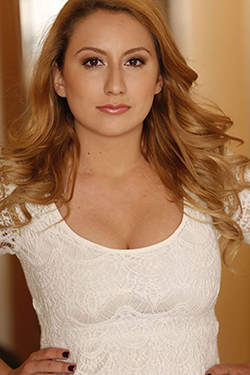
Serena Dykman
When Serena Dykman was four years old, her grandmother Maryla Michalowski-Dyamant recorded her testimony for USC Shoah Foundation. After Maryla described her experiences – she was deported from Bedzin, Poland, to Auschwitz-Birkenau, where she was forced to work as Dr. Josef Mengele’s translator, and survived a death march to Ravensbuck and Malchow concentration camps – the interviewer asked if there was anything she wanted to say to her granddaughter, Serena.
Maryla said she hoped Serena “does everything so it doesn’t happen again.”
As a young filmmaker, Serena is now fulfilling her grandmother’s wish. She is in the process of creating and financing a documentary film called Nana, about her and her mother’s journey to discover Maryla’s story.
Serena said her knowledge about her grandmother’s past was limited while she was growing up, since Maryla died when she was 11 and her mother didn’t like her talking about the Holocaust in front of her young granddaughter. But she knew Maryla often gave speeches and returned to Auschwitz on educational trips at least three times a year.
But Serena felt she learned too much about the Holocaust at too young of an age in school and wanted to distance herself from her family’s history. It wasn’t until after the 2014 attack on the Jewish Museum in Brussels, where her whole family lives, and the Charlie Hebdo attack in Paris, her hometown, that she decided to read her grandmother’s memoir for the first time.
She immediately saw frightening parallels between what her grandmother had experienced in the 1930s and ‘40s and the events of today.
“After reading the 188 pages, I understood who my grandmother was; more than a survivor, more than a hero, more than a Polish Jew, she was a real advocate for tolerance and peace,” Serena said. “As a filmmaker, and my grandmother’s granddaughter, I realized that it was my duty to keep her memory and message of tolerance alive through film.”
Serena and her mother Alice Michalowski, Maryla’s daughter, wanted the film to trace their own journey of discovering Maryla’s life story. They began filming only two months after Serena read the memoir, so that their research process could be part of the film. They re-traced Maryla’s footsteps in Bedzin, Auschwitz-Birkenau, Krakow, Warsaw and finally Brussels, where she emigrated after the war. In Brussels, they interviewed 15 people of all ages and backgrounds who talked about how much Maryla had impacted them.
“I was on the quest of learning more about my grandmother through the people that knew her, and it was magical to see how many lives she had touched, and to realize that her message was still being passed on today, more than a decade after her passing away,” Serena said.
Making Nana taught Serena why people always tell her what an extraordinary person her grandmother was. Maryla didn’t simply survive; she dedicated the rest of her life to educating the next generations about what can happen in a world without tolerance. And she was famous for her strong personality and sense of humor, Serena said.
Serena hopes that by seeing a young person like her in front of the camera, other millennials will be able to relate to the film and be inspired to join her in her fight to continue her grandmother’s message of tolerance.
“I hope people understand how crucial it is to respect one another,” Serena said. “I hope people understand the danger of intolerance, even when it is just an “innocent" comment. I hope people understand that the Holocaust is not just about the Jewish people, but the story of millions of people getting killed for who they are.”
To donate to Nana’s Kickstarter campaign, click here.